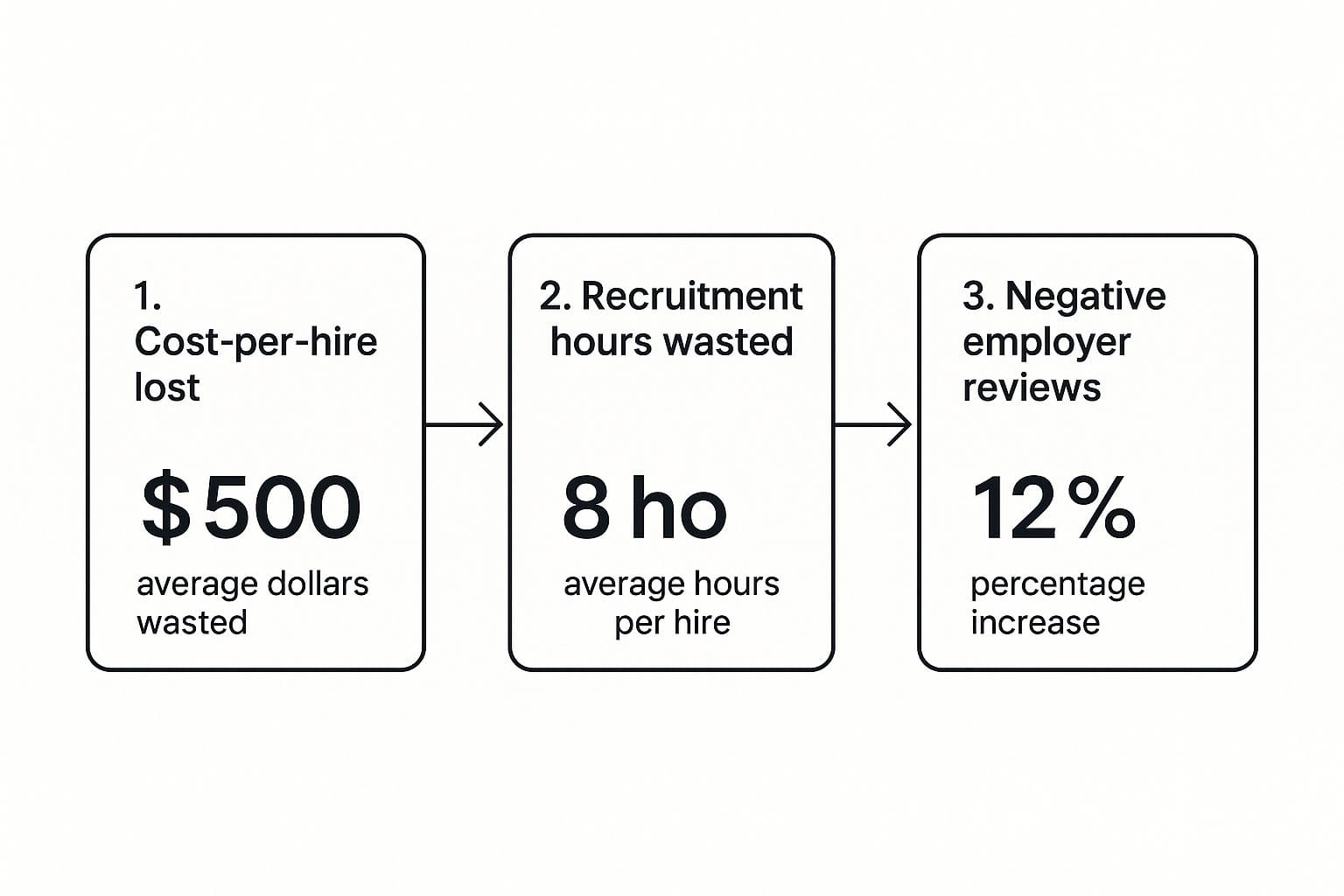Recruiter Ghosting and What to Do About It
Feeling ignored after an interview? Learn why recruiter ghosting happens and get actionable steps and templates to professionally handle the silence.

Dealing with recruiter ghosting requires a proactive and professional strategy to regain control of your job search. The most effective approach is to send one or two polite, strategically-timed follow-up emails to seek clarity, while simultaneously depersonalizing the silence and continuing to pursue other opportunities. This guide provides actionable steps and email templates to help you manage the situation, understand the reasons behind ghosting, and ultimately, know when it's time to move on with confidence.
Getting ghosted by a recruiter is a maddeningly common part of any modern job search. The good news? The solution is surprisingly straightforward: you need to be proactive, professional, and strategic.
The real key is to understand that the silence is almost never about you. It's about their chaotic world. Your job is to send a few structured follow-up notes to get some clarity, and then, most importantly, know when it's time to move on. This guide will show you how to do just that.
Tired of being ghosted? Our Ghosted Generator helps you craft the perfect follow-up response - from lighthearted ways to process the frustration to professional emails that get results. Take back control of your job search today.
Understanding the Silence of Recruiter Ghosting

Let's paint a picture you probably know all too well. You've just wrapped up a fantastic first call with a recruiter. You clicked, the role sounds like a perfect fit, and they promised to get back to you with next steps by the end of the week.
Friday comes and goes. Silence. Another week ticks by. Still nothing. This sudden, unexplained stop in communication is the very definition of recruiter ghosting.
It's the professional version of being left on read, and it turns a promising opportunity into a major source of anxiety. It's also incredibly common. Some reports show that over 75% of job seekers have been ghosted after an interview, leaving them to wonder if they messed up or if the job just disappeared into thin air.
Why Depersonalizing Ghosting Is Your First Step
The most critical thing you can do right now is to stop taking it personally. That wall of silence is almost never a judgment on your skills or your value as a candidate. More often than not, it's just a symptom of a messy, overloaded system on their end.
The reality is that recruiters are often juggling dozens of open roles at once, each with hundreds of applicants. When internal priorities suddenly shift, a project gets put on hold, or a budget gets frozen, candidate communication is sadly the first thing to fall through the cracks.
Once you really internalize this, you can shift your mindset from self-doubt to strategic action. Instead of just waiting around, you can start taking back control of your job search. This starts with building a rock-solid professional presence—and you can learn more about how to optimize your LinkedIn profile to attract more consistent and reliable engagement.
We've put together a quick-reference table below to give you an immediate action plan.
Quick Guide to Handling Recruiter Ghosting
This table breaks down a simple, professional follow-up strategy. The goal isn't to be pushy, but to get the clarity you need to keep your job search moving forward.
| Timeline | Recommended Action | Your Objective |
|---|---|---|
| 3-5 Business Days After Last Contact | Send a polite, concise follow-up email. Mention your continued interest and ask if they have an updated timeline. | Gently remind them of your application and confirm the process is still active. |
| 7-10 Business Days After Last Contact | Send a final, "closing the loop" email. Reiterate your interest but state you'll assume priorities have shifted if you don't hear back. | Gain closure and professionally disengage, leaving the door open for future opportunities. |
| 10+ Business Days After Last Contact | Stop following up. Shift 100% of your focus to other opportunities. Do not contact them again for this specific role. | Protect your time and energy. A lack of response is your answer. |
By following this simple timeline, you handle the situation with grace and professionalism, leaving a positive final impression regardless of the outcome.
This guide will walk you through the actionable steps and templates you need to navigate this frustrating situation. You'll learn exactly how to follow up, what the silence really means, and—most importantly—how to keep your job search moving with confidence. By the end, you'll see ghosting not as a personal rejection, but just as another data point on your path to finding the right role.
Supercharge Your Job Search
AI-powered tools to help you land interviews faster
Why Recruiters Disappear Without a Word

When a recruiter you've been talking to suddenly goes silent, it's natural to jump to the worst conclusion: "It must be me." But more often than not, the reason for the radio silence is buried in organizational chaos that has absolutely nothing to do with your qualifications.
Think of a recruiter as an air traffic controller for careers. They're managing dozens of open roles (the "flights"), each with hundreds of candidates (the "passengers"). It's a high-stakes, high-volume job where one unexpected change can throw the entire system into disarray.
A recruiter's silence is rarely a direct reflection of your qualifications. It is more often a symptom of high volume, shifting company priorities, or simple human error within a flawed system.
Getting a handle on their side of the story is the first step to depersonalizing the experience. It helps you move from a place of self-doubt to one of strategic understanding, which is a much healthier mindset for a job search.
The Overwhelming Workload of a Modern Recruiter
The sheer volume of work on a recruiter's plate is one of the biggest reasons for ghosting. Their job isn't just interviewing. They're also sourcing new candidates, coordinating schedules with multiple hiring managers, digging through applications, and negotiating offers.
It's not uncommon for a single recruiter to be juggling 15-20 open roles at the same time. If just one of those roles gets 200+ applications, the administrative weight becomes crushing. Personalized communication is often the first casualty.
- Juggling Multiple Pipelines: Every role is at a different stage. A recruiter might be screening résumés for a junior role, conducting final-round interviews for a senior one, and closing an offer for a third—all before lunch.
- Systemic Inefficiencies: You'd be surprised how many companies are still working with clunky, outdated Applicant Tracking Systems (ATS). A simple software limitation can make it surprisingly difficult to send a mass—but still polite—rejection email.
None of this excuses poor communication, but it does add some important context. When a well-meaning recruiter gets swamped, your application becomes one of thousands of data points they are struggling to manage.
Sudden and Invisible Internal Changes
Even more common than individual workload are the abrupt organizational shifts that happen behind closed doors. These decisions can stop a hiring process in its tracks, and the recruiter is often the last to know or is specifically told not to share the details.
Here are a few classic scenarios that lead to sudden silence:
- A Sudden Hiring Freeze: The finance department might unexpectedly slam the brakes on spending, putting all non-critical hiring on hold indefinitely. The recruiter is left with no updates to give.
- An Internal Candidate Emerges: Just as you're nearing the finish line, a strong internal employee throws their hat in the ring. They almost always get priority, and the external search is immediately called off.
- The Job Description Changes: The hiring manager has a change of heart about what the role should be, rendering the entire existing candidate pool irrelevant. The search has to start over from scratch.
These internal dynamics are completely out of your hands. And while it's incredibly frustrating, remember that ghosting can be a two-way street. The growing trend of candidates dropping out of the process creates massive headaches for recruiters, too. With over 20% of candidates ghosting at the interview stage, the whole system is under strain.
The Hidden Costs of a Bad Candidate Experience
Let's be blunt: recruiter ghosting isn't just a personal annoyance for a candidate. It's a real, measurable business problem with serious financial and reputational consequences. When a company simply stops communicating, it doesn't just lose out on one potential hire—it actively damages its own bottom line and sabotages future recruiting efforts.
These ripple effects don't just fade away after the job posting is taken down. Every hour your team spends sourcing, screening, and interviewing someone is a direct investment of time and money. When that entire process culminates in radio silence, that investment is completely wiped out. The company is forced to hit the reset button, wasting valuable resources and starting the search all over again.
Financial and Reputational Damage
The financial hit is more direct than most companies realize. Current reports show that U.S. organizations are looking at an average cost-per-hire of $4,129. Every time a promising candidate is ghosted and the role has to be re-filled, a huge chunk of that investment goes down the drain. These losses pile up quickly, especially when key business initiatives are put on hold waiting for that new hire.
But the damage goes far beyond just the immediate financial loss. The harm to an employer's brand can be even more severe—and much longer-lasting. Candidates who have a bad experience are incredibly likely to share their story, whether it's with a few trusted colleagues or broadcasted for the world to see on platforms like Glassdoor and LinkedIn.
This infographic paints a clear picture of how the direct costs snowball from a single bungled hiring process.

As you can see, wasted recruitment funds and lost hours don't just disappear. They fuel the negative online reviews that create a vicious cycle. Once your employer brand is tarnished, it becomes much harder and more expensive to attract top talent down the line. The best candidates almost always check a company's reputation before they even think about applying.
The Long-Term Consequences
A bad reputation doesn't just scare off job seekers; it can actually drive away customers. It's easy to forget that a surprising number of your candidates are also your customers. A negative, disrespectful hiring experience can absolutely lead them to take their business to a competitor.
This creates a hidden, compounding cost that stretches far beyond the HR department's budget.
When a candidate is ghosted, they don't just lose interest in the job; they often lose trust in the company's brand. This transforms a recruitment issue into a wider business problem, affecting both talent acquisition and customer retention.
Ultimately, smart companies get it. They understand that a positive candidate experience isn't just "nice to have"—it's a critical business strategy. By investing in clear, respectful, and timely communication, they're not just being courteous. They're actively protecting their financial resources, enhancing their brand, and building a stronger pipeline of talent for whatever comes next.
Your Professional Follow-Up Action Plan
When a recruiter goes quiet, it's easy to feel like you've lost all control. But you can take the power back with a smart, professional follow-up strategy. This isn't about being annoying or desperate; it's about getting the clarity you need to move on or stay hopeful.
A polite, well-timed message can cut through the chaos on a recruiter's desk and get you an answer. The key is to keep it calm and non-accusatory. Your goal is to preserve the relationship, no matter how things turn out.
The Gentle Nudge: Your First Follow-Up
Your first email should be a gentle nudge, not an interrogation. The timing here is key. Send this about 3-5 business days after the recruiter's promised deadline. If they never gave you a timeline, a week after your last chat is a good rule of thumb.
The goal is simple: get your name back to the top of their inbox and politely ask what's up. Keep it short, friendly, and to the point.
This kind of message shows you're still keen on the role but doesn't put the recruiter on the spot. It's a low-pressure way to reopen the conversation.
The Direct Inquiry: Your Second Follow-Up
If another week goes by and you've heard nothing but crickets, it's time for a more direct approach. This second message is your last real shot at getting a clear answer. The tone is still polite, but it should signal that you need a final answer to manage your own job search effectively.
This email gives them an easy out, acknowledging that things change and priorities shift. You're just asking them to close the loop so you can move forward.
When you're writing a follow-up, the little details matter. A well-crafted email can be the difference between getting a response and being ignored.
Closing the Loop: Your Final Message
Still no response after the second try? It's pretty safe to assume this opportunity isn't happening. At this point, sending a final "closing the loop" email is optional, but it's a classy move that leaves a great final impression.
In this message, you simply state that you assume the position has been filled or their needs have changed. Reiterate your interest in the company, wish them well, and say you'd be open to future opportunities. This closes the file on a high note and keeps the door open.
Follow-Up Email Templates for Any Situation
Sometimes you just need to see it in action. Use these practical email templates to follow up with a recruiter at various stages of silence.
| Situation | Effective Subject Line | Core Message |
|---|---|---|
| First Follow-Up | Following up on the [Job Title] role | "Hi [Recruiter's Name], Hope you're having a good week. I'm checking in on the [Job Title] position I interviewed for. I'm still very interested and was wondering if there were any updates on the timeline. Thanks!" |
| Second Follow-Up | Checking in one last time re: [Job Title] | "Hi [Recruiter's Name], I'm following up one final time about the [Job Title] role. I understand priorities can shift, but could you let me know if the position is still open? Any update would be helpful for my planning. Best," |
| Final "Closing the Loop" Email | Re: [Job Title] opportunity | "Hi [Recruiter's Name], Since I haven't heard back, I'll assume the [Job Title] role has been filled. I really enjoyed learning about your team. I wish you the best in your search and hope we can connect about future opportunities. All the best," |
Remember, you can adapt these to fit your own voice, but the core message should stay the same: professional, polite, and direct. If crafting the perfect message feels stressful, our follow-up email generator can help you create polished communications in seconds.
Ultimately, after that final step, it is absolutely essential to shift 100% of your focus to other opportunities. A non-response is a response. Your time and energy are the most valuable assets you have in your job search—spend them where they'll be respected.
Proactive Strategies to Avoid Being Ghosted

While you can't control a recruiter's actions, you absolutely can reduce your chances of getting ghosted. It's about taking a more assertive role in the hiring process—building a connection that makes you more than just another resume in their inbox.
This means setting clear expectations from the first conversation and staying organized and professional all the way through.
Set Clear Communication Expectations Early
Your very first interaction is the perfect time to establish the rules of engagement. Instead of just passively waiting for the recruiter to dictate the pace, you can proactively ask questions that frame how you'll communicate moving forward. This isn't pushy; it shows you're professional and organized.
At the end of your initial call, make a point to ask:
- "What does the hiring timeline look like for this role?"
- "What's the best way to follow up with you, and when should I expect to hear about the next steps?"
These questions signal that you respect their time while also creating a clear benchmark for when you should hear back.
Build Rapport and Stay Organized
Let's be honest: recruiters are human. They're far more likely to keep someone in the loop if they feel a personal connection. Make an effort to build some genuine rapport. Be engaged, ask thoughtful questions about their own experience at the company, and show authentic enthusiasm for the role.
Being memorable is your best defense against being forgotten. A candidate who is professional, organized, and personable is far less likely to fall through the cracks when a recruiter's workload becomes overwhelming.
At the same time, you need to be meticulously organized on your end. Forget messy spreadsheets. Using a dedicated job application tracker can be a game-changer, keeping all your notes, contacts, and follow-up reminders in one clean, central place.
Keep Your Options Open
This is the single most powerful strategy to take the sting out of recruiter ghosting: never put all your eggs in one basket.
Even if an opportunity feels like a sure thing, keep applying for other roles. Keep taking interviews. A full pipeline of opportunities prevents you from getting emotionally over-invested in a single outcome.
Interestingly, this is a two-way street now. Recent data shows that 44% of candidates admit to ghosting employers themselves, often because the hiring process is dragging on. Both sides are clearly looking for the quickest path to a good match. By continuously exploring other options, you stay in control of your search and ensure that one silent recruiter never brings your progress to a grinding halt.
Common Questions About Recruiter Ghosting
When you've been ghosted, a thousand questions pop into your head. The silence is confusing, and it's tough to know what to do next without feeling pushy or, worse, desperate. Getting straight answers is the first step to taking back control.
Let's walk through the most common questions candidates have when a recruiter suddenly goes dark.
How Long Should I Wait Before I Assume I've Been Ghosted?
This is the classic dilemma: what's the difference between patient follow-up and annoying persistence? A solid rule of thumb is to wait one full week after the date the recruiter said they'd be in touch. If they never gave you a specific timeline, wait one week from your last conversation.
If you send a follow-up and another week goes by with nothing but radio silence, it's safe to assume the role has been filled or your application isn't moving forward. It's time to shift your energy to other opportunities. Your follow-up strategy should also change depending on where you are in the process:
- After an initial screening call: One polite follow-up is plenty.
- After a formal interview: Two well-spaced follow-ups are perfectly acceptable.
Should I Ever Contact the Hiring Manager Directly?
Tread very carefully here. This is a high-risk, high-reward move that depends entirely on context. If you've already built a good rapport with the hiring manager during the interview, a short, professional email directly to them is usually fine.
But if the recruiter has been your only point of contact, going around them can look unprofessional and might burn a bridge. A much safer bet is to find another recruiter at the same company on LinkedIn. You can send them a quick, polite note explaining that you've lost touch with your original contact and were hoping they might know who's managing the role now.
My Dream Company Ghosted Me. Should I Give Up on Them?
Absolutely not. It's easy to take it personally, but one bad experience rarely reflects the entire company's culture. More often than not, you've just run into a clunky internal process or an individual recruiter who is completely swamped.
Don't let one person's poor communication sour you on a company you admire. The hiring world is messy. It's almost always the process that's broken, not the people or the company itself.
Keep following the company, engage with their posts, and don't hesitate to apply for other roles that fit your skills. A professional and positive attitude keeps the door wide open for the right opportunity down the road.
Is It Okay to Leave a Negative Online Review About Being Ghosted?
It's tempting to head straight to Glassdoor and vent your frustration, but your professional reputation is your most valuable asset. The hiring world is smaller than you think, and an emotional review can come back to haunt you.
Instead, frame your experience as objective, constructive feedback. This helps other candidates and gives the company something to actually work on.
For example, you could write: "The initial interview process was engaging and informative, but communication unfortunately ceased after the final round without an update or closure." This gets the point across without burning bridges. Professionalism is always the best long-term strategy.
--- Feeling overwhelmed by the job search? CV Anywhere provides all the tools you need in one place. From building a polished CV with our Smart CV Builder to tracking every application and practicing for interviews with our AI Coach, we help you move from application to offer with confidence. Take control of your career journey today at https://cvanywhere.com.
Tags
Related Articles
Introducing the AI Follow-up Generator: Never Miss a Beat in Your Job Search
Introduction: The Power of a Perfect Follow-up In today's competitive job market, simply submitting an application is rarely enough. The most successful job seekers understand the critical role that t...
Read more →8 Essential Job Interview Practice Questions for 2025
Succeeding in an interview isn't about memorizing perfect answers; it's about mastering a framework to articulate your value. This guide moves beyond generic advice to provide a strategic breakdown of...
Read more →Your Essential Cover Letter Sample Letter Guide
Your Essential Cover Letter Sample Letter Guide A powerful cover letter sample letter isn't just a template; it's your roadmap to success. These expert examples provide a proven framework, showing you...
Read more →Popular Articles
Finding the right cv template google docs can be a great starting point for your job search, but it's often not the most effective path to getting hired. Whilst templates offer a visual framework, the...
The best way to craft a comprehensive and professional CV of curriculum vitae is with a dedicated tool like CV Anywhere's CV builder. It ensures your document is perfectly formatted and optimised to h...
Stop searching for the perfect template of resume. Trawling through hundreds of options to find one that fits your experience is an outdated, frustrating process. The solution isn't a better template;...
Here is a detailed breakdown of the 12 best options for a resume maker for free available today. We've done the research for you, so you can stop searching and start building a professional, job-winni...
Picking the right resume templates is your first—and most important—move in getting a recruiter's attention. It's not just about looks; a great template is a strategic tool. It organizes your career s...